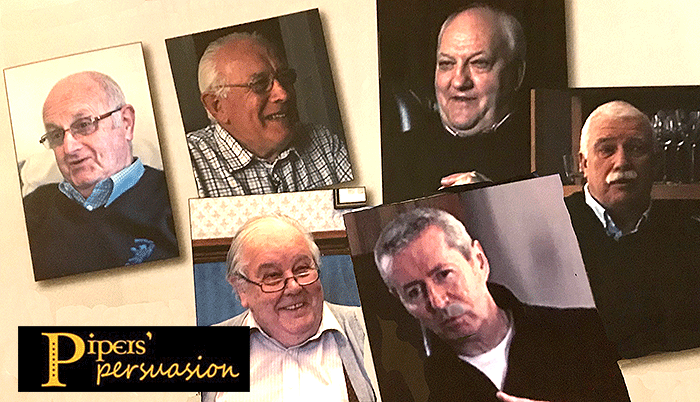
Several years ago former Strathclyde Police piper Allan Hamilton embarked on a project ‘Pipers’ Persuasion’. His aim was to record some of the leading figures in piping and pipe bands. Travelling the length and breadth of the land armed with microphone and camera, Allan and his team secured lengthy and insightful interviews. Now, during the pandemic, is the perfect opportunity to catch up on some of your piping history. As each year passes this resources becomes ever more valuable……..
Ten years ago I had the thought of persuading senior pipers and drummers to record facts and opinions surrounding their lives in piping and pipe bands. I felt it is essential to gather this for posterity. In this article I shall mention some of the interviewees and matters that surfaced concerning pipe bands.
We travelled down to Manchester to see many old friends and in particular Rose Fletcher, née Mellor. Rose was well into her 90s at that time but what shone through was her sheer cussedness in her early days, her determination to keep going till she was successful with her own Rose Fletcher Pipe Band.

By Allan Hamilton
Her struggle to provide instruments, uniforms, proper tuition and to gain the support and confidence of all around her, epitomised the constant struggle of the great majority in the pipe band world. She was a strong character who was well supported by her family over the decades. The result was a flourishing region of piping and pipe bands in the North West of England.
When, in the 1930s, the Cowal Championship was the World Pipe Band Championship, Clan MacRae Society Pipe Band won more first prizes than other in the first grade. Kenny MacLeod of McCallum Bagpipes spoke of his uncle Alec being the pipe major of ‘the MacRae’, until about 1966. The band won the 1954 World Championship with Alec and his brother Jimmy, Kenny’s father, and Eddie MacLellan, all in the ranks.
Eddie was known for his years as a piping instructor at the College of Piping and later was one of the first group of pipers to form the Glasgow Skye Association pipe band along with Jimmy. At the time, comment was made on the fine dress and deportment of the bandsman: many of them had just left the Army after the war.
There were usually only 10/12 pipers, three or four side drummers and the bass drummer – a common situation until the recent explosion in numbers. Kenny told us that Clan MacRae was the first band to play matched chanters – Robertsons.
In a fascinating interview Kenny explains how Tom McAllister Snr. was the first pipe major to introduce the formal pipe band attack with two, three-pace roles. Until then bands just started in a ramshackle fashion with pipers and drummers coming in when they felt like it. Many of the older pipers just couldn’t get the hang of the new intro and stopped competing.

I asked Angus John MacLellan to give his personal perspective on Strathclyde Police Pipe Band under Pipe Major Ian MacLellan and he enthused that a major feature in Ian’s success was his timing of exactly when to start blowing the pipes on competition day: never too early nor too late to achieve optimum tone.
Further, Ian was aware of the strengths and weaknesses of the other members of the band – whether they were nervous or otherwise – and set up their bagpipe accordingly. He also picked tunes that suited the ability of the band, especially the drum corps.
Interestingly this skill was again highlighted in the interviews with Robert Mathieson, former Pipe Major of Shotts and Dykehead, and his leading drummer Jim Kilpatrick. They were at pains to emphasise how closely they co-ordinated their work to produce a brilliant ensemble effect that more than once produced the World Championship title. That band has enjoyed decades of success, though with frequent interruptions from the Edinburgh and Glasgow police bands, Muirhead & Sons (60s/70s), and a number of overseas bands.
Robert Wallace explained how boys became involved in piping and drumming through the Boy’s Brigade movement. For example the famous 214 BB were so well taught that they graduated effortlessly into bands like Muirheads, Glasgow Police, Red Hackle and Clan MacRae.
This was down to the hard slog of practising exercises and doublings for about a year before going on to playing tunes. There were no photocopiers and only one tutor book between all the learners and this had to be copied out by hand by the pupil.
Robert explained the success of Muirheads and their brilliant playing under pipe major Bob Hardie. Bob was revered for his knowledge by all under his charge. Muirhead’s reputation faded somewhat as other bands overtook them on sound and Bob could never recapture the consistent tone he had in the 60s.
Other snippets: I visited Ireland and spoke to James Warnock about the introduction of his chanters and reeds. He gave a fascinating account of his collaboration with various pipe majors from Scotland in producing the polypenco pipe chanter. Bill McAllister and Bob Shepherd contributed information on reed making.
[wds id=”9″]
At the end of Angus Lawrie’s interview, where he spoke about life in the Strathclyde Police Pipe Band, he revealed how he made a sheepskin bag – absolutely fascinating. Ian McLellan told us how he acquired his famous Sinclair chanters.
Bob Shepherd and Mike Cusack gave wonderful inspirational talks on teaching and setting up juvenile bands. They both met in Texas in the mid ’90s when Bob met with Mike’s boys for a few days. Mike was very complimentary about Bob breathing new life into the Texas outfit.
While I was in Ireland I spoke with Sean Faloon who gave a very interesting, factual account of the derivation of the pipe bands from sectarian outfits to serious competition bands, totally non-discriminatory and welcoming to all interested players. Pipe bands provided a wonderful oasis during the Troubles in Ireland with everyone mixing to produce music of the highest calibre.
Of course no visit to the island of Ireland would be complete without interviewing Terry Tully and Richard Parkes – two different guys with the same object in mind – success at the top. They both divulged their particular preparations over the winter and the actions on competition day, coming at it from slightly different angles but with the same clinical precision.
These comments are extracts from video interviews which range between one and two hours in length. Though here I have selected pipe band topics, there are many other interviews which will be of general interest to pipers and drummers. www.piperspersuasion.com.
- This article is abridged from Pipe Band Magazine.
end














